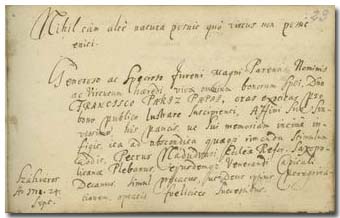
Nihil tàm altè natura posuit, quò virtus non possit eniti.
Generoso ac Specioso Juveni Magni Parentis Nominis ac Virtutum
haeredi, vivae omnium bonorum Spei, D[omi]no FRANCISCO PÁRIZ
PAPAI, oras exoticas pro bono publico lustrare suscipienti, Affini
Suo Suavissimo, his paucis, ut sui memoriam intimè infigit, ita ad
abscondita quaeque timenda stimulum addit, Petrus Nádudvari,
Eccle[si]ae Refor[matae] Saxopolitanae Plebanus, ejusdemque
Venerandi Capituli Decanus, Simul precatus, ut Deus ipsius
peregrinationem, optatis foeliciter successibus.
Szászváros A[nn]o 1710. 24. Sept.
| |
Nothing was set so high by Nature that it could not be reached by
Virtue.
To the noble and eminent young, heir of the
name and virtue of his great father, living hope of every good
people, to FERENC PÁPAI PÁRIZ, my sweet relative, when setting out
to visit foreign countries in the interest of common good, I
recommend myself with this trifle, and urge him to seek what is
hidden and dreadful. Péter Nádudvari, first minister of the
Reformed Church of Szászváros, and dean of the honoured chapter of
the same town. And I also apply to God to bless his peregrination
with the wished good success.
Szászváros, September 24, 1710.
|
p. 23. Szászváros/Orãştie, September 24, 1710
Nádudvari, Péter
(c. 1670-1726), Transylvanian
Reformed minister
Péter (P.) Nádudvari was born around 1670. He studied from 1678 in
Debrecen, and from 1692 in Nagyenyed (Aiud). He was a tutor of the
sons of Sámuel Bethlen (?-1708). With the support of his patron he
went in 1696 to the university of Franeker, and after his return
he became his court minister. He was second minister from 1700 in
Marosvásárhely (Târgu Mureş), and from 1705 in Szászváros; in 1706
he became first minister and dean in the same town. It was due to
his courageous bearing that the Reformed community could keep
their church and school in 1721. He was an ecellent preacher and
orator. Died in Szászváros in 1726.
He was the son-in-law of Ferenc Pápai Páriz Sen. (1649-1716), to
whom he wrote both a laudatory poem in 1710 and a funeral one in
1717. His speeches were collected and published by Zsigmond
Szathmári Pap on the costs of the writress Kata Bethlen
(1700-1759), daughter of Sámuel Bethlen, patron of Nádudvari. His
most important works are: Disputatio theologica de peccati
natura, propagatione, atque speciebus, quam … sub praesidio
… Stephani Enyedi … publice ventilandam proponit. Kolozsvár,
1695. – Idvesség uttya az az a hit ágazati körül való dolgoknak
tárháza predikátziókban. Kolozsvár, 1741. – Néhai … N. P.
uramnak … nyoltzvan-négy predikatzioi, mellyekben az igaz
keresztyén vallásnak szent iráson épült fundamentomos ágazati …
ki-beszélltetnek, és a mellyeket méltgs gróf Bethleni Kata …
akaratjára, és kegyes költségével, … néhol egész prédikátziókkal
is ki-toldozván, világ eleibe botsátott Szathmári Pap Sigmond.
Kolozsvár, 1741.
Péter Nádudvari wrote his memento on September 24, 1710, in
Szászváros into the Album of his beloved brother-in-law Ferenc
Pápai Páriz Jr., when this latter was going to set out abroad. The
reading of the year is somewhat uncertain. It cannot be 1711,
because around September 20 Ferenc Pápai Páriz was already in
Vienna, as it is attested by the notes of Count Bethlen, Prince
Apafi and Mihály Balku (p. 9,
35, 19), as well as
by a letter sent by Pápai Páriz to Count Sándor Teleki on
September 20, 1711 [Peregrinus]. It seems therefore, that the
travel mentioned here by Nádudvari was postponed by a year, either
because of lacking financial support, or the Independence War of
Hungary, which was just over by the summer of 1711.
• Dáné
27, 28 • Graaf • Jakó-Juhász 114 • MÉL • Szinnyei • ÚMÉL • ÚMIL •
Zoványi-Ladányi |

